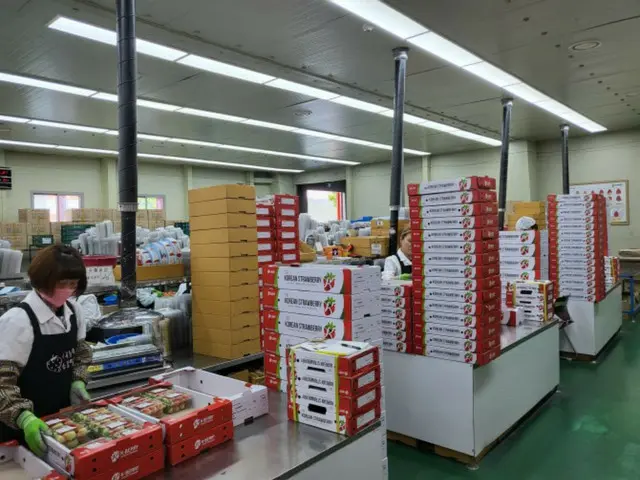With exports of $100,000 (approximately 11.1 billion yen), it ranked first among Asian countries and was the second largest exporter of fresh agricultural products from Korea after kimchi ($155.6 million/approximately 24.3 billion yen).
The reason Korean strawberries have become so well-known around the world is largely due to the role played by "K-Verry." K-Verry was established in 2011 by strawberry growers and exporters.
The export integration organization was established in 2009 and is located in Jinju, South Gyeongsang Province, Korea's largest strawberry producing area. The small office is located in a corner of the second floor of the Jinju Agricultural Wholesale Market.
It manages the entire process from strawberry production to distribution and overseas marketing, and in effect serves as the base of operations for strawberry exports.
Woo Hye-yoon, team leader at K Berry, said, "Through cooperation with strawberry growers and exporters, we can secure export volume and price competitiveness.
"There are export integrated organizations for other items besides strawberries, such as peppers, grapes, pears, and tomatoes, but K-Berry is considered the most outstanding organization in terms of organizational strength and negotiating ability," he said.
Currently, 43 producers' associations and 64 exporters are members of K-Berry. K-Berry members account for 96% of Korea's total strawberry exports. The Pear Exporters Association (98%)
In particular, K-Berry strictly controls quality, which is the most important aspect of exporting agricultural products. Due to the nature of Korea, which has mostly small farms, it is difficult to grow large quantities of agricultural products with uniform quality.
It is difficult to collect and export products from multiple farms, and there is a possibility that the quality may vary. K-Berry sets quality standards and manages all stages of the agricultural production, from production, harvesting, packaging, and sales.
In addition, quality control personnel are stationed at Agricultural Product Centers (APCs) throughout the country, and they ensure that customers can enjoy the same quality products no matter where they are in the world.
Korean strawberries, which are strictly controlled in this way, are exported to the world market under a single brand, "K-Berry." Each production organization has its own brand.
In the case of exports to other countries, where strawberries are relatively less well known, there is a possibility that they will be confused as to which ones are Korean. In addition, the recent problem of Chinese agricultural products being passed off as Korean is also being addressed through the unification of brands.
The joint logistics system, which will be implemented from 2022, is also a major success. Starting this year, the Korean government's logistics cost subsidy will be abolished, and logistics costs will be increased to ensure price competitiveness.
Strikes emerged as a major issue. Normally, each exporter would get an individual quote for transportation costs from the airlines and negotiate prices, but K-Very negotiated directly with the airlines for the entire export volume.
"Each major airline has a unit price for transportation that is determined through price negotiations. This unit price is much cheaper than if the companies negotiated individually," said Woo.
The plan is to expand this to all products other than strawberries. K-Berry is working to develop new markets with the goal of achieving $100 million in strawberry exports. This year, the company has already expanded to Germany, Dubai, Saudi Arabia, and other countries.
The company plans to promote the product at food fairs in Dubai, Singapore, the United States and elsewhere. Team leader Woo said, "We also held a promotional event in Dubai last year, and the delicious, juicy strawberries were on sale there for the first time.
"The reaction was that people were eager to try it for the first time," he said. "In terms of quality, it is quite competitive. The important thing now is to get the word out widely through tasting events."
The Korean government will also strengthen the export competitiveness of agricultural products through the "Fresh Agricultural Product Export Integrated Organization Development Project" starting this year.
The support will be provided in five areas, including marketing, research and development, quality improvement and management, and logistics improvement. A source from the Ministry of Food, Livestock and Livestock Industry said, "In the past, the government supported export logistics costs, but from now on, the export integration organization will support each
"We will enable them to enhance their competitiveness through their own expertise."
2024/06/13 07:11 KST
Copyrights(C) Edaily wowkorea.jp 107

